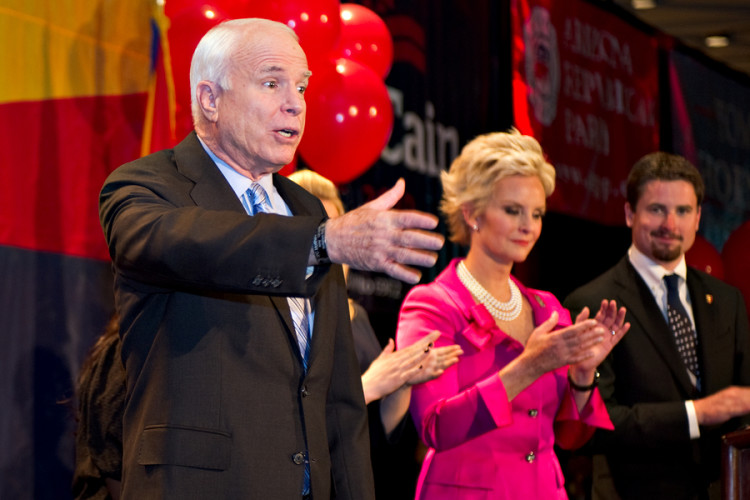John McCain, Republican Senator and Vietnam War Hero, Dies at 81

published Aug 25, 2018, 7:56:00 PM, by Laurie Asseo
(Bloomberg) —
John McCain, the 2008 Republican presidential nominee and Vietnam War hero who was a senior voice on defense and foreign policy in the U.S. Senate, has died. He was 81.
McCain died at 4:28 p.m. Saturday, his office said in an emailed statement. His wife Cindy and his family were with the senator when he passed away at his home in Arizona. In July 2017, McCain was diagnosed with glioblastoma, an aggressive form of brain cancer. One year of treatment failed to prevent his condition from worsening and on Aug. 24 his family announced that he had chosen to discontinue medical care.
The onetime Navy pilot was North Vietnam’s most prominent prisoner of war. After returning from 5 1/2 years of captivity, McCain began a congressional career of more than three decades that made him a force in national politics. He ran for president in 2000 and 2008, winning the Republican nomination in his second campaign but losing to Democrat Barack Obama.
Tributes immediately flowed for McCain, with President Donald Trump tweeting: “My deepest sympathies and respect go out to the family of Senator John McCain. Our hearts and prayers are with you!”
Barack and Michelle Obama said in a statement: “Few of us have been tested the way John once was, or required to show the kind of courage that he did. But all of us can aspire to the courage to put the greater good above our own. At John’s best, he showed us what that means. And for that, we are all in his debt.”
The Arizona Republican served as chairman of the Senate Armed Services Committee and was frequently a sharp critic of President Trump. A defense hawk who sought increased military spending and joined fellow Republicans in opposing abortion and gay marriage, McCain infuriated many in his party by violating GOP orthodoxy on other issues. In July 2017, he joined two other Republicans in voting with Democrats to kill a GOP-only effort to repeal Obama’s health-care law, the Affordable Care Act.
McCain had returned to the Capitol following his brain-cancer diagnosis to vote on the health-care bill. In a dramatic speech on the Senate floor days before the final vote, he urged colleagues to curb hyper-partisanship and criticized GOP leaders for drafting their bill in secret and without Democratic input.
‘Bombastic Loudmouths’
“Stop listening to the bombastic loudmouths on the radio, television and internet,” the senator said during his speech. “To hell with them. They don’t want anything done for the public good.”
In December 2017, he joined fellow Senate Republicans in an initial vote for a massive tax-cut plan that also would repeal Obamacare’s requirement that most people have health insurance or pay a penalty.
McCain also broke with most Republicans earlier by opposing President George W. Bush’s tax cuts, backing a path to citizenship for undocumented immigrants and co-authoring legislation to limit campaign spending.
The senator occasionally tangled with Trump, blasting the president’s decision to withdraw from the Trans-Pacific Partnership trade deal as a “serious mistake” and insisting that Congress must investigate Russia’s meddling in the 2016 presidential election.
Trump mocked McCain’s prisoner of war experience. “He was a war hero because he was captured,” Trump said during the 2016 campaign. “I like people who weren’t captured.”
In early 2017, McCain called for spending $430 billion more on defense above existing levels over five years.
Defense Spending
“Rebuilding our military will not be cheap” but inaction “will irreparably damage our military’s ability to deter aggression and conflict,” McCain said in a statement.
He criticized Trump for a lack of leadership on the world stage in a December 2017 article on the Medium website. “Our president sees virtue in his unpredictability and prefers uninformed tweets to intentional strategies. We owe our allies and partners — and the American people — better,” he wrote.
McCain lost his bid to become the Republican presidential nominee to George W. Bush in 2000. Eight years later, McCain won the nomination and chose as his running mate Alaska Governor Sarah Palin, a polarizing figure who drew an ardent following among conservative Republicans but whose incendiary statements and lack of experience in national government drove others away.
During the heated campaign in 2008, McCain insisted that his supporters respect Obama, admonishing one of them at a town hall who called the Democratic nominee an Arab. “No ma’am,” McCain responded. “He’s a decent family man, citizen that I just happen to have disagreements with on fundamental issues.”
John Sidney McCain III was born in the Panama Canal Zone on Aug. 29, 1936. The son and grandson of Navy admirals, he followed them to the U.S. Naval Academy. A rebellious streak earned him enough extra guard duty at Annapolis to have marched to Baltimore and back 17 times, McCain said during the 2008 campaign. He graduated in 1958, fifth from the bottom of his class.
War Hero
He became a Navy pilot and was shot down in 1967 over Hanoi. In prison, McCain was repeatedly beaten and was put in solitary confinement for more than two years. In mid-1968, as his father took over as commander of U.S. forces in the Pacific, McCain’s captors sought to sap POW morale by offering him early release. McCain refused.
McCain returned from Vietnam a hero in 1973. More than two decades later, as a veteran senator, he supported President Bill Clinton’s decision to normalize diplomatic relations with Vietnam. He told the story of his family as co-author of the 1999 book, “Faith of My Fathers: A Family Memoir.”
After returning from Vietnam, he served as head of the Navy’s Senate liaison office. He met Cindy Hensley, the daughter of a wealthy Arizona beer distributor, and they married after he was divorced from his first wife, Carol. McCain retired from the Navy, moved to Arizona and became an active Republican.
He won an open U.S. House seat in 1982 and four years later was elected to the Senate, succeeding Barry Goldwater, who retired.
Nonconforming Positions
In Congress, McCain’s iconoclastic streak made him difficult to pigeonhole.
He defied President Ronald Reagan during the 1980s by calling for the withdrawal of Marines from Lebanon. Yet McCain called for aggressive deployments of troops overseas following the Sept. 11 attacks.
While seeking large increases in defense spending, McCain was a sharp critic of expensive military projects such as the F-35 Joint Strike Fighter, and he provoked the ire of colleagues who sought to add Navy ships and other Pentagon projects in their home states that he considered unnecessary.
He also tried unsuccessfully to eliminate free, reserved parking spaces for members of Congress at the two Washington-area airports.
In 1989, McCain and four other lawmakers were accused of intervening with federal regulators on behalf of Arizona savings and loan executive Charles Keating during the industry’s collapse. Keating had contributed more than $100,000 to McCain’s campaigns. The Senate Ethics Committee rebuked McCain for “poor judgment” but found no improper conduct.
He emerged from that ordeal with a new mission — to change the way federal elections are financed. The campaign finance law co-authored by McCain and Democratic Senator Russell Feingold of Wisconsin earned him the enmity of many social conservatives who felt the new law put their organizations at a competitive disadvantage.
John McCain Was a True American Hero: Michael R. Bloomberg
His stances on social issues were in the GOP mainstream: he opposed gay marriage, supported a constitutional amendment to outlaw desecration of the flag and backed a repeal of Roe v. Wade, the Supreme Court ruling that legalized abortion.
McCain had seven children from his two marriages: daughters Meghan and Bridget and sons Jack and Jimmy with his second wife; and sons Doug and Andy and daughter Sidney with his first wife.
–With assistance from Greg Giroux.To contact the reporter on this story: Laurie Asseo in Washington at lasseo1@bloomberg.net To contact the editors responsible for this story: Kevin Whitelaw at kwhitelaw@bloomberg.net Steven Gittelson, John McCluskey
COPYRIGHT
© 2018 Bloomberg L.P







No Comment